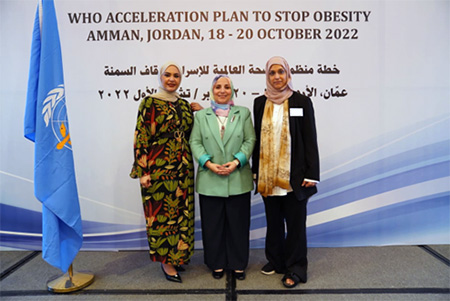 The Bahraini Farmers Market is a national initiative that offers fresh homegrown and local produceThe “100-day challenge” was established to drive measurable impact in countries in a short period of time by encouraging the systematic and consistent use of data in the prioritization of WHO’s work. To realize this vision, nine country offices were selected from the different WHO regions to pilot the challenge, with Bahrain and the Islamic Republic of Iran as the two countries from our Region.
The Bahraini Farmers Market is a national initiative that offers fresh homegrown and local produceThe “100-day challenge” was established to drive measurable impact in countries in a short period of time by encouraging the systematic and consistent use of data in the prioritization of WHO’s work. To realize this vision, nine country offices were selected from the different WHO regions to pilot the challenge, with Bahrain and the Islamic Republic of Iran as the two countries from our Region.
Here, the WHO Representative to Bahrain, Dr Tasnim Atatrah, speaks to us about converting priorities into tangible results through the “100-day challenge”.
Guided by recommendations from WHO headquarters and the Regional Office, Bahrain conducted a review of noncommunicable diseases, and determined that addressing obesity should be one of its national priorities. Bahrain is one of the first countries in the Region to pilot a WHO acceleration plan to reduce obesity, in alignment with the national priorities, identified in the WHO and Ministry of Health joint workplan, and Sustainable Development Goal (SDG) 3 on good health and well-being. The next step includes holding a workshop on addressing obesity, with a focus on the Gulf context.
The 100-day challenge has amplified engagement across all levels of the Organization
 Dr Buthaina Ajlan (left), Chief of the Nutrition Section of the Bahraini Ministry of Health, Dr Tasnim Atatrah (middle), WHO Representative in Bahrain and Mrs Fatima Ahmed Isa (right), Head of the Standards Development, Testing and Metrology Directorate at the Ministry of Industry and Commerce in Bahrain.
A second national priority is moving towards sustainable cities and communities through the healthy universities programme. There has been intensive progress on this. Through multisectoral action by schools, universities and health providers, led by the Ministry of Health, healthy dietary guidelines are being implemented. Moreover, the Ministry of Health, with support from WHO, is producing communication products for health facilities on implementing dietary guidelines. In addition, assessments are being carried out in five universities as part of the healthy universities programme.
Dr Buthaina Ajlan (left), Chief of the Nutrition Section of the Bahraini Ministry of Health, Dr Tasnim Atatrah (middle), WHO Representative in Bahrain and Mrs Fatima Ahmed Isa (right), Head of the Standards Development, Testing and Metrology Directorate at the Ministry of Industry and Commerce in Bahrain.
A second national priority is moving towards sustainable cities and communities through the healthy universities programme. There has been intensive progress on this. Through multisectoral action by schools, universities and health providers, led by the Ministry of Health, healthy dietary guidelines are being implemented. Moreover, the Ministry of Health, with support from WHO, is producing communication products for health facilities on implementing dietary guidelines. In addition, assessments are being carried out in five universities as part of the healthy universities programme.
“Health goes beyond health facilities”, says Dr Atatrah, adding that outreach in universities will result in progress on additional SDG targets, such as youth and women’s empowerment and quality education.
Dr Atatrah highlights the key factors that assist implementation on the ground, including the availability of evidence-based data, committed leadership and multisectoral action. Through the 100-day challenge, she hopes the country will serve as a model both regionally and globally.
This initiative can show the comparative advantage of having a country office on the ground
She points out that building trust and uniting stakeholders to integrate health in all policies can be a lengthy process. The Bahraini government has managed to implement outstanding initiatives towards its health-related goals, and the successful accelerated implementation of the 20222023 Programme Budget workplan in Bahrain can be used as a model for the country in the planning of the 20242025 Programme Budget.


